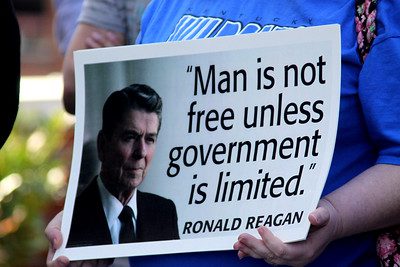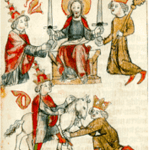So if both Integralism and Christian Nationalism are wrong, what is the Christian conservative to do?
Those are the two Christian political theories out there today. They are related–Integralism mostly for the Catholics and Christian Nationalism mostly for the Protestants–and can motivate Christian political activists to address the horrendous dysfunctions of our society.
If those two approaches are theologically deficient, should Christians just give up on politics? That’s what some are advocating. Stop agitating, stop supporting candidates, stop voting. Let the secular world degenerate while the church forms its own subculture and waits for Christ’s return.
Well, there is another alternative: the political theory that Christian conservatives used to have.
Mark Tooley reminds us of that in his Law & Liberty article A Christian Nation? He is responding to Senator Josh Hawley’s article in First Things entitled A Christian Nation. (I just found out that, as a new Missouri resident living in the congressional district that I do, I am being represented by both Hawley as my senator and hard left squad member Cori Bush as my congressional representative! It’s almost enough to turn me too against liberal democracy!) Hawley is articulating a very mild version of Integralism and Christian Nationalism, one which retains Constitutional government and draws back from an established church, while agreeing with those ideologies that position that the government should advance “the good” and work to bring back a Christian culture. Tooley responds (my bolds):
There is much that is laudable in Hawley’s diagnosis if not so much in his prescription. Much of America’s public life is shifting away from biblical transcendence towards either rabid secularism or stridently “woke” utopian fantasies with religious zeal while denying religion’s power. Unmentioned by Hawley is a growing post-Christian right that is indifferent to Christian doctrines and ethics but exploits Christianity as a tribal identity against leftist enemies. He is unfair about earlier versions of politics from a traditional Christian perspective that supposedly focused on culture while ignoring economics.
The 1980s and 1990s Religious Right was deeply influenced by Presbyterian cultural critic Francis Schaeffer, Baptist theologian Carl Henry, Catholic philosopher Michael Novak, and Lutheran/Catholic editor and writer Richard Neuhaus. They advocated a synthesis of traditional morality, democratic constitutionalism, and free market economics as the preferred alternative to planned economies. Their ideas are out of fashion in our time, but they were also out of fashion when first proposed. Hawley dismisses their perspective without contending with it. He implies they left economics outside their spiritual concern. But they advocated for private enterprise not just as more productive than statism, but as better exemplifying God-given human creativity.
To be sure, this approach to Christian activism has a much more modest political vision than that of the Integralists and the Nationalists, with a more modest expectation of what government should do. It attacks manifest evils in the government, such as legalized abortion. And it preserves the liberty of the church–an institution hardly mentioned by Hawley–so that Christians can be salt and light in the culture, rather than overlords.
“But this approach has failed!” say the illiberal critics. It overturned Roe v. Wade.
“But it didn’t prevent gay marriage!” The divinized all-powerful, omnipresent state created gay marriage. A limited government would never presume to do so. The divinized state has also imposed its woke theology on schools, public policy, businesses, and the law. A properly limited government would never do that.
It is as if the Christian big-government conservatives want to keep the divinized state, but change the divinity. Instead of the state itself being the supreme authority over all of life, they want the true God to exercise His rightful authority over the state and to use the state as His instrument to create a godly nation. God does exercise His authority by means of political vocations to restrain external evil, but that is not enough to make anyone, much less a nation, godly. For that we need the church, but not the church as a political institution designed to enforce the Law, as with the Roman Catholic hierarchy that the Integralists want to invest with temporal power. We need a church that proclaims the Gospel of salvation through the forgiveness of sins in the Cross of Jesus Christ.
Sen. Hawley concludes his article by saying,
America has been a Christian nation. We can be again—if Christians will recover again their confidence that the gospel of Jesus Christ speaks to every facet of our common life. For the future of the nation, and the honor of the gospel, we must.
Yes, the gospel of Jesus Christ speaks to every facet of our common life, but it does so by bringing grace and forgiveness, since every facet of our common life is stained with sin. The Senator is speaking of the gospel as some sort of law. Catholics often do that, and now I am hearing the same from Protestant evangelicals. God’s law does speak to every facet of our common life. The state is restricted to the First Use of the Law, concerned with curbing external sinful behavior. That is critically important, though it can never make anyone righteous.
But the state should not “speak to every facet of our common life.” The state has its sphere, and, properly, it is a relatively small one. Our common life includes the family, our participation in the economy, our social networks, the church, and all of our other vocations. The state should stay out of “every facet of our common life” and, as much as possible, leave us alone.
UPDATE: If you are all for limited government, the critics say, how can you oppose abortion and wage all of your other culture war issues? The issue is what government is limited to. The primary purpose of government, rightly considered, is to protect its citizens. Thus, operating an effective criminal justice system–as opposed to defunding the police–and building a strong military are legitimate functions of a limited government.
Limited government Christian conservatives oppose legalized abortion because the government is supposed to protect the lives of children in the womb. On the same principle, limited government Christian conservatives are right to fight against mutilative transgender surgery, pornography, threats to the family, etc.
Photo by Gage Skidmore via Flickr, CC by-SA 2.0












